- Home
- Anne Stuart
Under an Enchantment: A Novella
Under an Enchantment: A Novella Read online
Under An Enchantment
By Anne Stuart
Copyright 2012
Dear Reader,
With a name like Anne Stuart, I would obviously have an affinity for Scotland and all things Scottish. When I was a girl I used to fantasize that I was the lost queen of Scotland, and when the time came I would kick Queen Elizabeth out of my spot and rule my highland kingdom. Back then I imagined border lords and fierce lairds and all manner of dark, dour passion, and while I now accept (regretfully) that I’ll never be queen of Scotland, I still believe in all the romance of that country.
I’ve always loved selkies. The idea of a graceful seal coming to land and taking the shape of a man, with the sole purpose of begetting a child, is the sort of thing that stirs my blood, and at heart I’m just as gullible as my heroine. I’d believe, simply because I wanted to and because reality is far too cold and lonely.
Fortunately when you write stories you can shape reality to suit you. This little island exists only in my imagination, and the characters come from my heart. But the lovely thing about books is that, once released into words, they’ll live forever.
I hope you enjoy reading this as much as I enjoyed writing it.
Best always,
Anne Stuart
(who is much better looking and nicer than the Anne Stuart who was queen of Scotland.)
Chapter 1
Malcolm James Kendrick MacLaren walked out of the sea one fine autumn day. The villagers of St. Columba stopped in the midst of their labors, staring, as he strode from the surf with a purposeful grace.
He was a tall man, though perhaps not as tall as some. The clothes that clung to his wet body were plain, dark, and he was leanly built, well muscled, wiry. His black hair hung down his back, overlong, and his face was narrow, secretive, with dark eyes, strongly marked brows, a fierce blade of a nose, and a thin-lipped mouth that was surprisingly erotic.
In all, he didn’t look the slightest bit like a seal.
That didn’t stop Collis from staring, his gnarled hands motionless on the thick net. The man kept walking, straight and true, and his dark gaze met Collis’s. He came toward him, ignoring the others who stood and watched, stopping in front of him.
The seawater clung to his sun-darkened skin, and up close those dark eyes were neither black nor brown. They were the deep, dark green of an angry ocean.
“Can I help you, lad?” Collis’s voice came out strained, and he cursed his sudden weakness. This wasn’t a lad, this was a man. One who was eerily familiar.
The man from the sea didn’t seem to take offense. “Collis MacDewar?”
His voice was deep, rich, and Collis turned pale, wondering if it was the voice of his nightmares, coining to haunt him. “Do I know ye?” he asked.
“You know my people.”
Collis shivered. He’d never hunted seals—like most of the people of St. Columba, he viewed them as friendly spirits. Only the few more hard-hearted of the fisherfolk, such as Domnhall, hunted the gentle creatures for their rich pelts.
“Have you come for me, then?” he asked. He was an old man, nearly seventy, and had seen many things. If his time had come, then he’d go willingly. Though he never thought death would come to him in the form of seal-man.
It was so faint he almost thought he’d imagined it. The slight upturning of that narrow mouth, the glint of light that reflected in his eyes. “I’ve come from Catriona,” he said.
Collis shut his eyes for a brief moment. Catriona had been lost some thirty years ago—the sea had taken her and her body had never been found. “I’ll go with you,” he said resolutely.
There was no missing the smile this time. “No,” he said. “I’ll go with you.”
Collis didn’t hesitate. He dropped his nets, turned, and started toward the road leading into the hills. The man from the sea came behind him, following closely, and the townspeople watched, silent, respectful, as they made their way through the village, away from the shore. All their lives they had heard stories of the selkie, the seal people who took the form of humans when they walked upon the land. This was the first time they’d been blessed enough to see one.
Collis lived alone in a tiny croft halfway up the small hill in the midst of the island. He’d never married, never found any reason to. He worked hard, as all the people of St. Columba did, hewing out a living from his rocky soil and the merciless sea. It had been a long life, a decent life, and his only regret would be to leave behind his border collie, Tammas.
The dog rushed out of the croft, scenting their approach, his ears back with sudden wariness as he approached the stranger. The man held out one elegant hand, and the dog sniffed it, testing. And then his ears came up, he barked a greeting, and moved past to fling himself on his master, all lolling tongue and besotted doggy gaze.
Collis paused in the doorway of his cottage, staring at the man who’d followed him up the hill in silence. “I’d’ve thought she’d be afraid of you.”
The man smiled again, and there was something bewitching about that smile as he leaned down and scratched behind Tammas’s ears. “Why?”
“Dogs don’t like the supernatural.”
“Is that what I am?”
“You walked out of the sea, didn’t you? Without so much as a boat in sight. We’ve heard stories of the selkie all our lives, here in the islands. You’d be the first one we’ve seen in the flesh.”
“A selkie,” Malcolm said, considering it. “It’s as good an explanation as any. Have you got a fire going, Collis?”
“Of course,” he said, affronted. “I’m not daft enough to let the coals die out. You’ll want to come in and warm yourself. You’re soaked to the bone.”
“You’re right.” Malcolm ducked his head to step inside the small, tidy cottage. He seemed to dwarf the place, not so much by his sheer size, but by the force of his presence. He moved to the banked fire, holding out his hands to warm them over the coals.
They were long, elegant, the hands of a lord and yet not. They were tanned, well made, yet obviously used to hard work. The man looked at him over his shoulder with a slashing, mocking smile, and there was something uncannily familiar about his eyes.
Collis stared at him, fighting the superstitious fear that filled him. “Who are you?” he demanded in a hoarse voice. “I told you. I’ve come from Catriona.”
“She drowned.”
The man shook his head, and his long black hair hung damply against his shoulders. “She talked about you, old man. The only friend she trusted. You would have saved her if you could.”
“Saved her from what?”
“From the brutality of men. But you were too late. She was beaten and thrown into the sea, and it was only by the grace of God that she survived. The grace of God, and my father.”
“Who did this?” Collis demanded hoarsely, knowing the answer anyway.
“I don’t know whose hand struck the blow. But I know the men who planned her death. Sir Duncan Spens. His cousin Torquil. And Sir Finlay Wallace.”
Collis shut his eyes in sorrow. “Aye,” he said heavily. “I’d always suspected as much.”
“You were too late to save her, old man. But you aren’t too late to avenge her.”
“She’s dead, then?”
Not a flicker of expression passed over the younger man’s face, and yet Collis could feel the depth of his grief and fury. “This past Christmastide.”
Collis stared into the coals of the banked fire, unseeing. “I thought she’d been dead these past thirty years. Why should it grieve me so?”
“You can avenge her, Collis. You can avenge a sweet lass whose only crime was to run afoul of a group of murderous rich men. You can help me.�
�
“Aye,” he said slowly. “I can help you.” His gaze narrowed as he looked at the stranger in his tiny croft. “And who are you?” he asked again.
“Malcolm.”
Collis digested the name, with its history of kings and murder. “And what of your father, lad? You said Catriona was saved by the grace of God and your father. Who’s your father?”
Malcolm smiled, the dark, sardonic smile. “The king of the seals, Collis. Who else would he be?”
Ailie had forgotten her shoes again. Nay, that wasn’t strictly the truth. She’d remembered, once she’d set her bare feet on the thick grass outside the dower house, but she hadn’t wanted to go back and fetch them. She didn’t like them, enclosing her narrow feet, cramping her toes. She liked the feel of the grass, the sand, the gravel beneath her soles. Whenever she could she dispensed with her shoes, and her maid, Margery, had given up chasing after her. Now that Sir Duncan was dead, there was no one to try to force her into standard modes of behavior. Until Torquil decided to marry her.
No, he’d already decided, Ailie knew it in the depths of her heart. He was already making the financial arrangements with her brothers, and she was to have no say in the matter. It mattered not that she walked in to tea with her feet unshod, her thick reddish-blond hair a tangle down her back, her dress unfastened, her mind on faraway dreams. It wasn’t her mind or her clothing that seemed to interest Torquil.
She knew lust when she saw it in a man’s eyes. She’d seen it in her husband’s eyes, recognized it when she was a young lass of seventeen and been given in marriage to a randy old man in his late sixties. The lust Duncan had felt for her traveled no farther than his eyes, and when he’d died four years after their wedding day, Ailie was still a virgin.
Torquil was a good ten years younger, still in his fifties, and the desire he felt for her would move beyond his eyes; she knew it with a sinking feeling. He’d been watching her for the past few years as his older cousin grew more and more feeble, and he’d even touched her, his thick-fingered hands skimming her breasts when he thought she was too feather-headed and dreaming to notice.
She didn’t like his hands. They were the hands of a pig, with short, thick fingers and stubby palms, and she didn’t want him touching her, taking her. He wasn’t a bad man, a cruel man, but she wanted no man at all, not as much as she wanted her freedom.
However, it wasn’t going to be up to her. She’d heard her brothers talking, their loud voices carrying through the cozy dower house where she’d taken up residence once Sir Duncan had died. They assumed she was witless, and she encouraged that belief quite shamelessly. They might as well have assumed she was deaf, so loudly did they plan her upcoming nuptials. As soon as they ascertained that she wasn’t carrying Duncan’s child.
Scant chance of that, she thought, moving through the thick woods toward the town. Even if Duncan had been able, she was hardly likely to conceive after four supposedly barren years. But her brothers were careful men, as was Torquil. They wanted no questions to stain the marriage of Torquil Spens to his cousin’s half-mad widow.
She was humming under her breath, an old tune about Bonnie Prince Charlie, just the sort of song bound to drive her protective family mad. Such songs had been outlawed a century ago, and to sing them still courted trouble.
But sing them she did, as well as songs about faeries and nymphs and broonies. There were times when she wondered whether she might be a changeling. Perhaps some enterprising troll had stolen the real Ailie Wallace from her cradle, stolen her from a father who had no interest in daughters and a mother who’d turned her face to the wall and died as she’d lived, quietly, once she’d brought forth a sixth offspring, her only daughter. Perhaps the real Ailie lived with the wee folk, leaving the changeling Ailie behind. It would explain her oddness, her affinity for things that most people insisted weren’t quite real.
She should be living in the woods on fairy dust and moon milk. Instead she’d grown up surrounded by five bullying brothers, dreaming her dreams, singing her songs, growing steadily more peculiar until her family was ready to send her away and have done with her. Someplace where they wouldn’t have to be shamed by her odd behavior and dreaming ways.
Had it not been for Sir Duncan Spens, that future would have been hers. It was sheer bad luck that she’d wandered into the dining room one night when both her father and his old friend had drunk far too much whiskey, sheer bad luck that in his drunken state Sir Duncan had seen her height and her red-gold hair and fancied himself ready for a second wife.
She’d tried to escape the trap fate had provided for her. She smeared dirt on her face, let her hair hang in tangles down her back, and done her best imitation of poor mad Ophelia. She’d sung “Wae Is Me for Charlie” and the like, but to no avail. Sir Duncan declared himself pleased with a half-witted bride—she’d provide no distressing intellectual conversation. She’d be content to spend her married life on her back, where he wanted her to be.
She’d tried to run away, but her brother Angus had come after her, and being a brute and a bully, he’d beaten her unmercifully. And so she’d married, and lain on her back in Sir Duncan’s huge bed.
But Sir Duncan’s desire outstripped his capabilities. And as the weeks turned into months, and then into years, he no longer attempted to claim his child bride. He was content simply to watch her.
Torquil would never be satisfied with so little. And while she hadn’t yet given up the notion of running, St. Columba was a small island, and she was well-known. Escape would be well nigh impossible. Since Torquil as well as her brothers would come after her.
She had time enough. Her brothers were very conventional Scots, true followers of the kirk and the laws of God and man. They wouldn’t marry her off to Torquil until the customary year of mourning was up. She was safe and snug in the dower house, while Torquil had moved into his cousin’s manor house, the huge drafty building he’d always coveted, as he’d coveted his cousin’s wife. Sir Duncan had fathered no children—Torquil and Ailie were his only heirs—and Torquil’s desire to unify the inheritance was a good part of his lust for her.
Duncan had been dead six weeks. She had a little over ten months of freedom left, and she intended to enjoy them to their fullest.
“Good day to you, Lady Spens,” Jane Morrow, the baker’s wife, greeted her. They looked after her, the people of St. Columba did, watching over her with anxious affection that was only faintly stifling.
Ailie flung back her hair and smiled at the woman. “Good day to you, Jane. It’s a lovely day, is it not? A good day for the faeries.”
Jane gave her that kindly smile. “Indeed it is, mistress. Have ye heard about the selkie?”
Ailie stopped in her tracks, her toes chilled on the cobbled roadway. “A selkie?” she said. “Have you heard a new story?”
“Nay, lass,” Jane said comfortably. “We’ve seen one.”
For a moment Ailie didn’t move. “Seen one?” she echoed. “Are you certain?”
“And wouldn’t I be knowing, me being bred of stock that mated with the seal people in centuries past?” Jane demanded. “As were half the inhabitants of this village, and well you know it. He walked out of the ocean, miss, straight up to Collis MacDewar, and took him up to the hill.”
“Did he look like a seal?”
“Faith, no!” Jane laughed. “He took the form of a man, of course. They always do. And what a man! Handsome as sin. Of course, he’d have to be.”
“Why?” Ailie asked.
“He’s come for a bairn.”
“He’s going to steal children?” Ailie asked, horror breaking through her usually airy demeanor.
“Nay, lass. He’s going to find a young girl and get her with child. Then he’ll go back to the sea. That’s what they do, you know. That’s why most of us on this island are descended from the seal people. Except for that bastard Domnhall.” She spat as she said the name of the seal hunter.
“He’s handsome, you say?”
“As the devil. With eyes that could look right through you,” Jane said vigorously.
Ailie smiled. The sun was bright overhead, and at least for now, no one had any power over her. “I’m going to see him,” she said. “I’ve never seen an enchanted creature before. Not up close.”
“Ye mustn’t!” Jane said, suddenly sober. “Haven’t I warned you? He’s looking for an innocent young lass to seduce.”
“I’m a widow, Jane. Hardly an innocent.”
“Lass, you’re one of God’s creatures, innocent as a babe, and I imagine you always will be. I wouldn’t want you hurt.”
“He won’t hurt me,” Ailie said serenely. “Old Morag will see that I’m kept safe.”
Jane shook her head, but Ailie had already moved onward, through the town, heading up the narrow track that led to Collis’s croft. The people of St. Columba called out to her as she passed, but she didn’t hesitate. They would worry about her, when there was no need. No selkie from the great dark green sea would hurt her. She wanted to see a faerie up close, look into those dark wondrous eyes Jane had talked about, and learn if she could see her future.
She could just imagine her brothers’ reaction when they heard of Collis’s visitor. Fortunately most of them were in Edinburgh, only Angus remaining behind to watch over their half-mad little sister. If he caught wind of an enchanted creature come to St. Columba, he’d probably send word to Domnhall the seal hunter to dispatch him.
She couldn’t let that happen. Collis would warn him, no doubt, but he might not listen. She’d never met a selkie before, she had no idea how practical they might be. Having lived their lives at the bottom of the sea, they might not know of the treachery of man.
It was a warm day for September. She climbed steadily, up the narrow path, rolling up her loose sleeves as she went, baring her strong forearms to the bright sun, shaking her thick hair out behind her. This time next year she’d be trapped once more. Torquil might own her in bed, but he couldn’t force her to behave. He would have to stand by as she forgot her bonnet, her hairpins, her shoes. With any luck, if he insisted on marrying her, he might at least grow tired of her witlessness. Leaving her free to live her life of dreams.

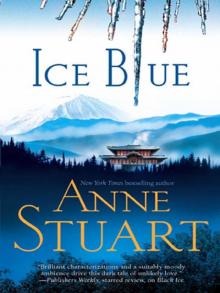 Ice Blue
Ice Blue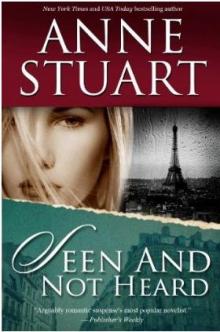 Seen and Not Heard
Seen and Not Heard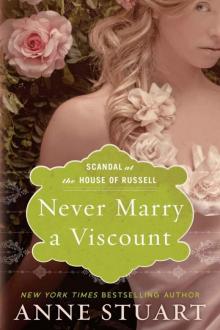 Never Marry a Viscount
Never Marry a Viscount Heartless
Heartless The Devil's Waltz
The Devil's Waltz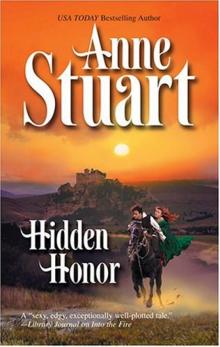 Hidden Honor
Hidden Honor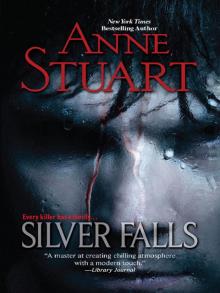 Silver Falls
Silver Falls Fire and Ice
Fire and Ice Nightfall
Nightfall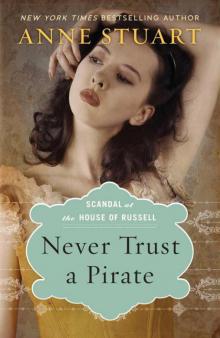 Never Trust a Pirate
Never Trust a Pirate The Soldier and the Baby
The Soldier and the Baby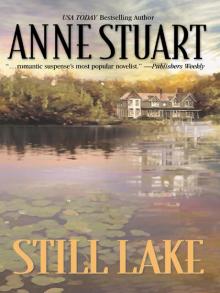 Still Lake
Still Lake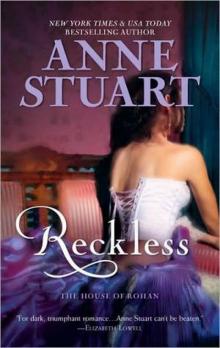 Reckless
Reckless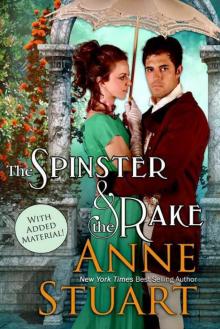 The Spinster and the Rake
The Spinster and the Rake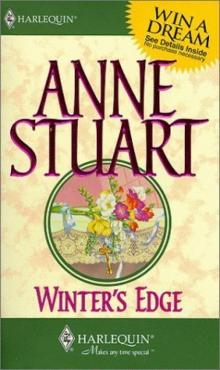 Winter's Edge
Winter's Edge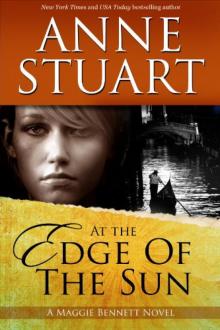 At the Edge of the Sun
At the Edge of the Sun Into the Fire
Into the Fire Night of the Phantom
Night of the Phantom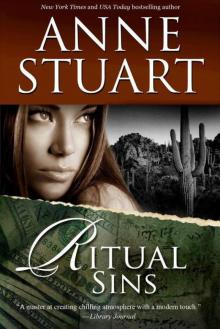 Ritual Sins
Ritual Sins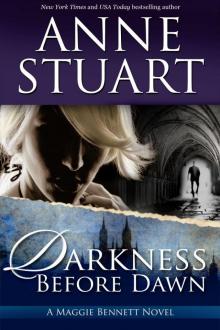 Darkness Before the Dawn
Darkness Before the Dawn Against the Wind
Against the Wind Ruthless
Ruthless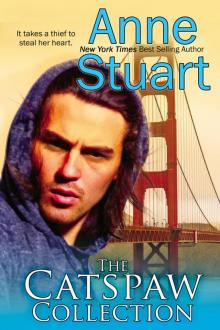 The Catspaw Collection
The Catspaw Collection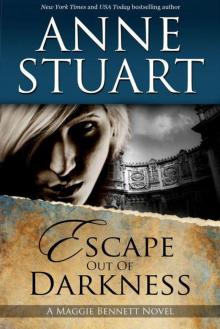 Escape Out of Darkness
Escape Out of Darkness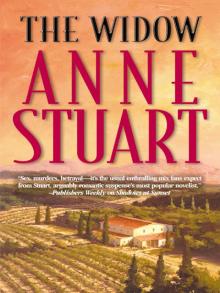 The Widow
The Widow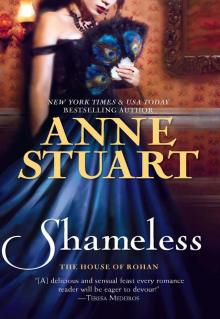 Shameless
Shameless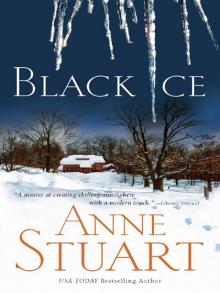 Black Ice
Black Ice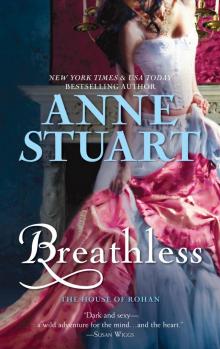 Breathless
Breathless Shadows at Sunset
Shadows at Sunset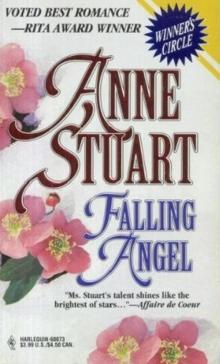 Falling Angel
Falling Angel Housebound
Housebound Cold as Ice
Cold as Ice The Wicked House of Rohan
The Wicked House of Rohan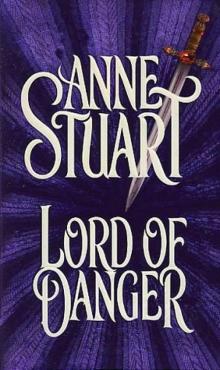 Lord of Danger
Lord of Danger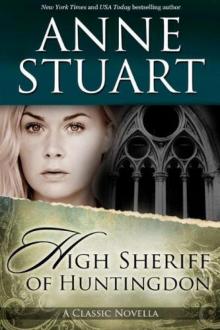 The High Sheriff of Huntingdon
The High Sheriff of Huntingdon Wildfire
Wildfire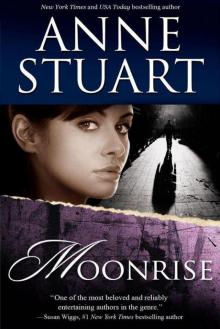 Moonrise
Moonrise The Demon Count's Daughter
The Demon Count's Daughter Date With a Devil
Date With a Devil To Love a Dark Lord
To Love a Dark Lord Driven by Fire
Driven by Fire Special Gifts
Special Gifts Ice Storm
Ice Storm Shadow Lover
Shadow Lover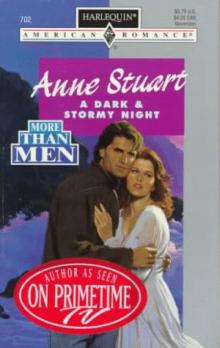 A Dark & Stormy Night
A Dark & Stormy Night Now You See Him...
Now You See Him...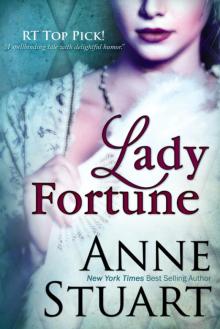 Lady Fortune
Lady Fortune Glass Houses
Glass Houses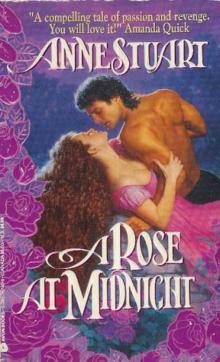 A Rose at Midnight
A Rose at Midnight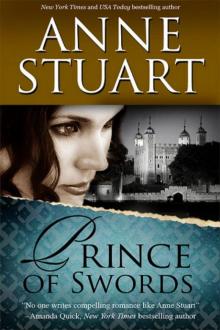 Prince of Swords
Prince of Swords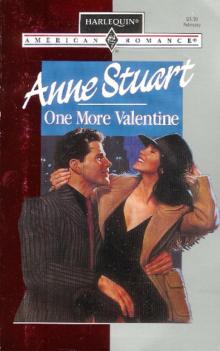 One More Valentine
One More Valentine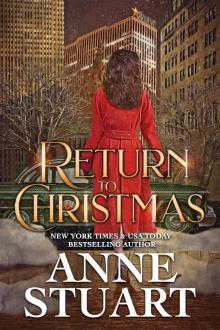 Return to Christmas
Return to Christmas Tangled Lies
Tangled Lies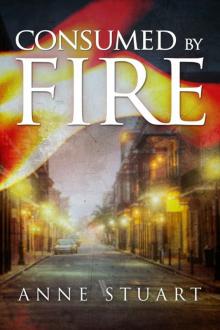 Consumed by Fire
Consumed by Fire The Fall of Maggie Brown
The Fall of Maggie Brown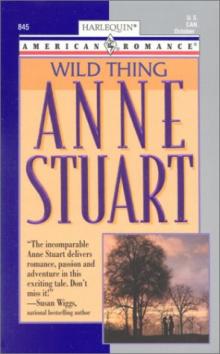 Wild Thing
Wild Thing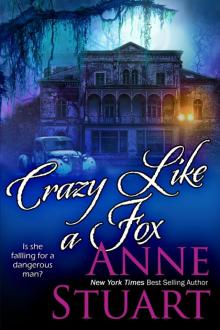 Crazy Like a Fox
Crazy Like a Fox The Demon Count
The Demon Count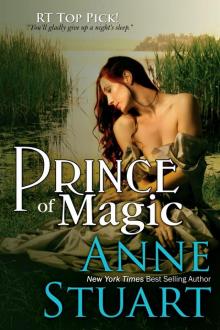 Prince of Magic
Prince of Magic Wildfire (The Fire Series Book 3)
Wildfire (The Fire Series Book 3)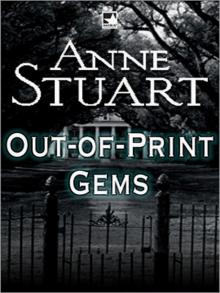 Anne Stuart's Out-of-Print Gems
Anne Stuart's Out-of-Print Gems Shadow Dance
Shadow Dance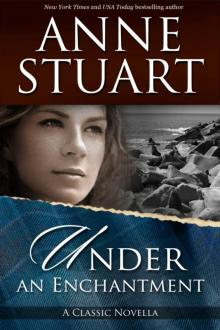 Under an Enchantment: A Novella
Under an Enchantment: A Novella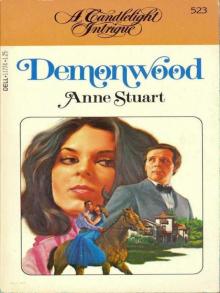 Demonwood
Demonwood Blue Sage (Anne Stuart's Greatest Hits Book 3)
Blue Sage (Anne Stuart's Greatest Hits Book 3) Barrett's Hill
Barrett's Hill Angel's Wings (Anne Stuart's Bad Boys Book 5)
Angel's Wings (Anne Stuart's Bad Boys Book 5)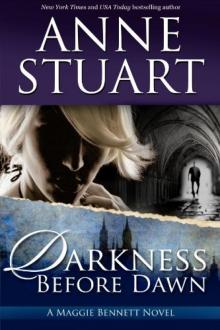 Darkness Before Dawn
Darkness Before Dawn The Right Man
The Right Man The Houseparty
The Houseparty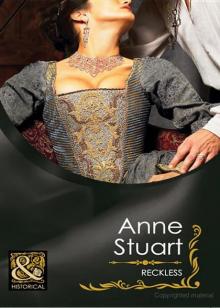 Reckless_Mills & Boon Historical
Reckless_Mills & Boon Historical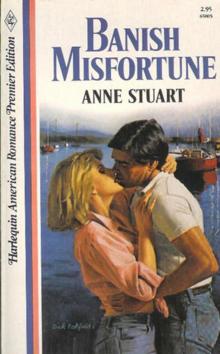 Banish Misfortune
Banish Misfortune Angel's Wings
Angel's Wings Chain of Love
Chain of Love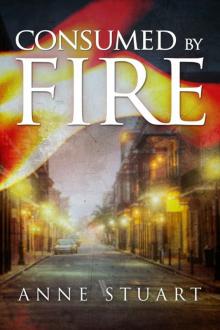 Consumed by Fire (The Fire Series)
Consumed by Fire (The Fire Series)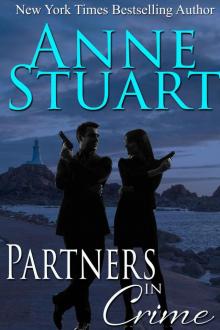 Partners in Crime (Anne Stuart's Bad Boys Book 4)
Partners in Crime (Anne Stuart's Bad Boys Book 4) The Soldier, The Nun and The Baby (Anne Stuart's Greatest Hits Book 2)
The Soldier, The Nun and The Baby (Anne Stuart's Greatest Hits Book 2)